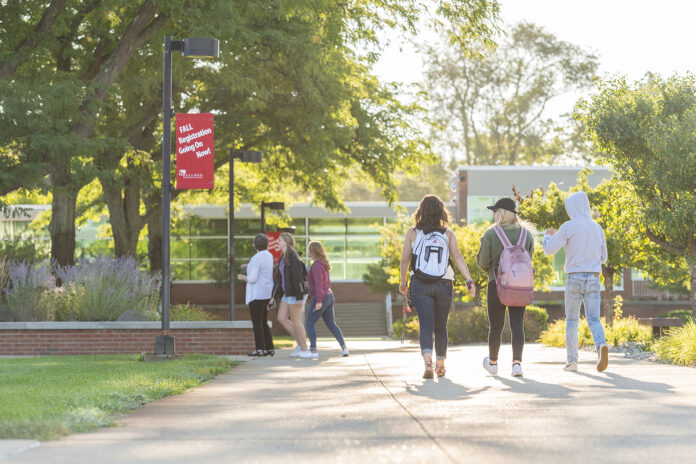For many students at Kellogg Community College, a college education isn’t the only commitment they juggle. From early morning classes to late-night shifts, these students struggle to balance earning a degree and a paycheck.
“I sometimes feel burnt out, and I find myself too tired to get homework done,” said Jordan Garcia, a 19-year-old Nursing student who works at least 30 hours a week as a manager at Hungry Howie’s. “Next thing I know, I’m cramming all my homework in before the due date, and I feel like I’m not giving school my 100%.”
Garcia is just one of the many students navigating through college and work. According to a study done by Georgetown University, eight out of 10 students work at some point or another while in college. Reasons for working while attending college vary, whether it be for tuition or supporting their family, but the challenges that come along with it are often the same: time management, burnout or even trouble maintaining a social life.
Balancing work and school takes more than a well-thought-out schedule and multiple Red Bulls. For many, it means sacrificing social gatherings, hobbies and even sleep.
“The hardest part of working during college is finding time for myself,” said Leanna Manuel, a KCC Radiography student who works at a local sushi restaurant. “It sometimes feels like the activities I enjoy just for myself cut into my schoolwork or work, so I cannot allow myself to do them.”
Manuel’s situation is not uncommon, especially for students in health care programs, many of whom actually work in medical environments while studying. Although these jobs can be demanding, they offer real-world experience that ties in with their academic learning.
At KCC, staff and faculty recognize the reality that most of their students work. Lindsey Thomas, a counselor at KCC, said that the college offers resources that support students and help them succeed despite these struggles.
“A lot of students benefit from some sessions to explore their stress management, time management or other needs related to figuring out how to balance it all,” Thomas said. “Outside of counseling, I know that KCC encourages professors to be flexible. I think good academic advising is also important to help students choose what and how many classes would be best for their schedule and create a plan to realistically meet their educational goals.
“Lastly, opportunities for students to work on campus also come to mind. The on-campus jobs are very flexible and are intended to work around a student’s changing class schedule, making them a convenient option for some students.”
KCC also offers online and hybrid courses to give students more flexibility in how and when they complete their coursework. Still, not all students are aware of these options or feel comfortable asking for help.
“Often, we learn the most about ourselves and grow when we are challenged,” Thomas said. “I also like to point out to students who are new to college that there is a period of transition where everyone is figuring out what makes the most sense for them. There is no right or wrong way to be a student, but it is important to stay open to learning from mistakes to move forward most effectively.”
Rising college costs mean more students have no choice but to work. According to a 2023 report from the National Center for Education Statistics, 43% of undergraduate students who work do so out of financial necessity, and nearly 25% work more than 20 hours per week.
“I chose to work while going to school because financial aid was able to pay for this year, however, I wanted to have some sort of income in case this changes in the future,” Manuel said.
But while working may help relieve financial pressure, it can be stressful.
“There are days that I have no motivation to go to work or do homework, especially on days I am scheduled for longer shifts,” Manuel said.
Despite the hardships, students like Manuel and Garcia are finding ways to cope and deal with their stress in order to succeed in college. Many believe the discipline, resilience and time-management skills they’ve developed will benefit them long after graduation.
“I make a to-do list complete with which day would be best to do certain assignments, go to the gym and other responsibilities,” Manuel said. “The visual of my priorities helps me to organize my mind and see that it’s not as complicated as the burnout feeling makes me think.”
The story of balancing work and school is becoming the norm. And for those juggling the responsibility of both, success isn’t defined by a perfect schedule, but by perseverance.

























